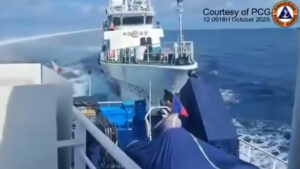The aggressive acts habitually and deliberately committed by the Chinese are an affront to our sovereignty and a threat to our national security. But more than national security is involved — our economic security is also under threat. This is not something that the Philippines is taking sitting down.
Take the most recent incident on Oct. 12. Three vessels of the Bureau of Fisheries and Aquatic Resources (BFAR) were anchored near Pag-asa Island when Chinese Coast Guard and Maritime Militia vessels approached, conducted dangerous maneuvers, fired water cannons, and rammed the stern of one of the vessels. Fortunately, no crew members were injured.
The incident took place while the BFAR vessels were conducting a lawful resupply and monitoring mission, assisting fisherfolk under the Kadiwa para sa Bagong Bayaning Mangingisda program of the government. What happened was not only an insult to Philippine sovereignty. It also disrupted a mission for fisherfolk already facing dire economic challenges as a result of being prevented by China from fishing in our own, legally determined waters.
Economic security means that individuals and communities can meet their essential needs over time. But if our fisherfolk cannot fish in our waters — their very source of livelihood — how can they put food on the table, maintain a decent home, or send their children to school?
While the Philippines is determined to assert its sovereignty and safeguard the economic security of its people, we recognize that we cannot do this alone. We are fortunate to have numerous partners that help strengthen our defense posture and provide our citizens with the stability they need to live with dignity.
A Stratbase-commissioned survey conducted by Pulse Asia from Sept. 27 to 30 revealed that the United States remains the Philippines’ most trusted economic partner, with 77% of respondents expressing this view. Japan followed at 44%, and the ASEAN regional bloc at 29%.
Other foreign partners mentioned were Australia, the United Kingdom, Canada, South Korea, and the European Union — a clear indication that the Philippines continues to deepen ties with democratic and rules-based economies. China was also among the options, but only 6% of respondents said they trusted it as an economic partner.
In another Pulse Asia survey conducted during the same period, respondents named nearly the same countries as those best positioned to help the Philippines counter Chinese coercion and aggression in the West Philippine Sea. Seventy-seven percent cited the US, 45% mentioned Japan, and 30% pointed to Australia. Other countries mentioned were Canada, the United Kingdom, South Korea, Germany, and France — partners seen as capable of supporting the Philippines’ defense and security needs.
One of these countries, France, has recently stepped up its cooperation with the Philippines. In a forum hosted by the Stratbase Institute in partnership with the Embassy of France on Oct. 16, French Ambassador to the Philippines Marie Fontanel highlighted renewed bilateral cooperation following the letter of intent between the ministers of Armed Forces of both countries on Dec. 23, 2024. The landmark agreement laid the foundation for closer defense collaboration, capacity building, and regular exchanges on strategic challenges, particularly in the maritime domain.
“Our engagement has moved beyond declarations towards tangible joint initiatives, information sharing, and trust building. We must continue to exchange our assessments of the asymmetric threats we face collectively. Beyond security and sovereignty, we must never forget that the ocean is also a human space, one that sustains lives, livelihoods, and cultures,” Ms. Fontanel said in the final installment of Blue Talks.
Indeed, the Philippines continues to face constant provocation, aggressive encroachment, and even the weaponization of environmental issues by China — acts that undermine sovereign rights, freedom of navigation, global trade, and the integrity of shared maritime commons.
Effective maritime governance is not only about defending one’s territory but also ensuring that the seas remain a shared space of peace, prosperity, and sustainability. The Philippines cannot — and should not — stand alone. We must continue to promote cooperation among like-minded states such as France, uphold international law, and ensure a free, open, and rules-based Indo-Pacific.
In the end, in the face of persistent external threats, it is about finding partners you can rely on and trust.
Such partners must be true to their word, respect international law, and refrain from bullying or coercion to get what they want. They must not twist narratives or justify unlawful actions under false pretenses.
The countries consistently identified by Filipinos in the two surveys have long demonstrated a pattern of reliability and integrity in both words and actions. They are not new partners; rather, they have stood by the Philippines through time, sharing our commitment to peace, stability, and inclusive prosperity.
They recognize that the stakes are high — not just for defense and sovereignty, but also for the region’s economic future. These dependable partners respect the sovereignty of nations and uphold peace and stability in the Indo-Pacific and beyond. That the same countries are trusted across both economic and security fronts reflects a clear pattern of public confidence.
Insights from these surveys affirm the Philippines’ strategic alignment with like-minded democracies and open-market economies — partners that value transparency, rule of law, and a free and open Indo-Pacific.
Indeed, security cooperation and economic resilience are two sides of the same coin. We cannot fully enjoy sovereignty if our people remain in poverty and insecurity. The constant assaults on our sovereign rights drain resources that could otherwise strengthen efforts toward sustainable and inclusive prosperity.
The risks to both national security and livelihood are real, daunting, and ongoing. Our alignment with trusted, like-minded partners is not just diplomacy — it is a strategic imperative to safeguard both our economy and our sovereignty.
Victor Andres “Dindo” C. Manhit is the president of the Stratbase ADR Institute.

